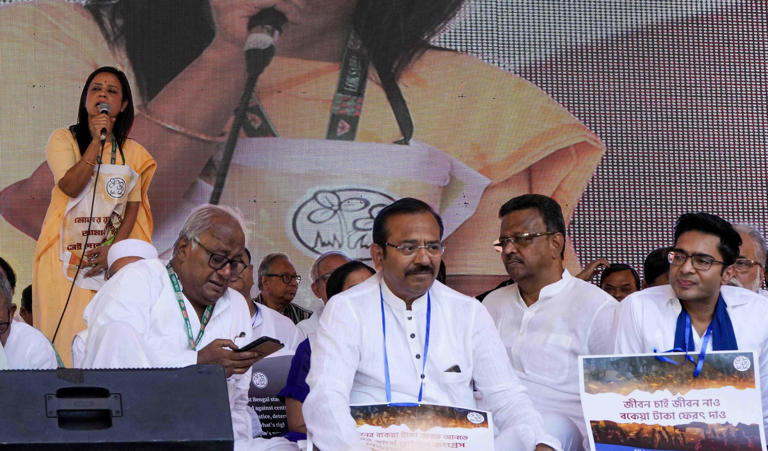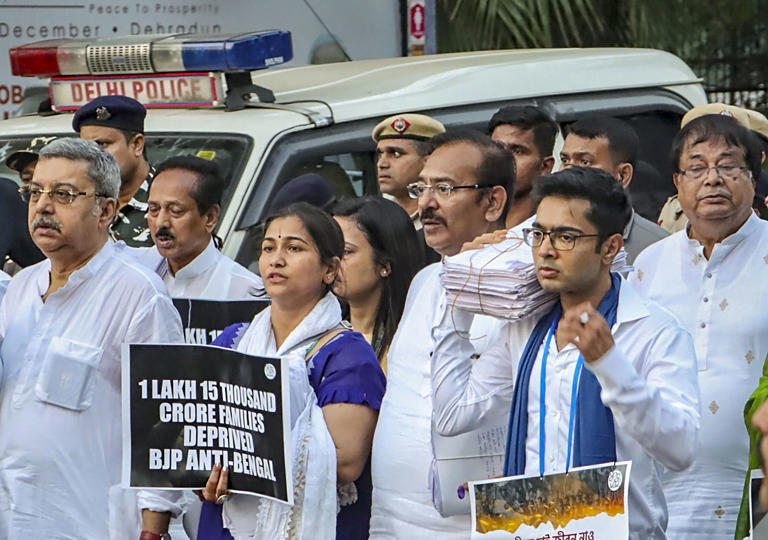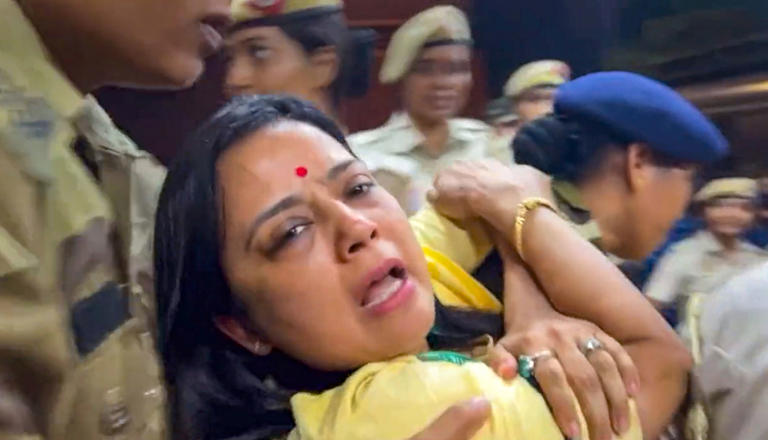TMC leaders detained during dharna at Krishi Bhawan for release of funds to Bengal, released hours later
The detention of TMC general secretary Abhishek Banerjee and other party leaders during their dharna at the Union Rural Development Ministry office in Delhi underscores the ongoing tensions and conflicts in Indian politics. Their demand for a meeting with the minister and subsequent detention lasted approximately three hours.
Abhishek Banerjee’s characterization of the incident as a representation of ‘New India’ reflects the party’s strong opposition to recent developments. He expressed concern over the treatment of public representatives by the Delhi Police and the booking of journalists under anti-terror laws like the UAPA (Unlawful Activities (Prevention) Act). Banerjee’s statement labeling the day as a “black day for Indian democracy” indicates the severity of the situation, highlighting the importance of democratic principles and freedom of expression.
This incident unfolded against the backdrop of an ongoing struggle between the Central government and the West Bengal government regarding the release of funds to the state. The TMC’s decision to hold protests in the national capital for the second consecutive day illustrates the persistence of these conflicts and their determination to raise their grievances on a national stage. The situation exemplifies the complex and often contentious nature of Indian politics, where disputes between ruling and opposition parties can lead to confrontations and public demonstrations.
The protest organized by Abhishek Banerjee and a contingent of TMC lawmakers, state ministers, and supporters, including MGNREGA workers, took place in two stages in Delhi. Initially, they held a two-hour sit-in at Rajghat on Mahatma Gandhi’s birth anniversary, but it was cut short when they were forcibly evicted by the police.
Subsequently, the group marched to the Rural Development Ministry at Krishi Bhawan, where they had a scheduled appointment with Minister of State Sadhvi Niranjan Jyoti. However, after waiting for an extended period, TMC leaders claimed that the MoS refused to meet with them, citing a restriction on meeting more than five representatives.
In response to this refusal, led by Abhishek Banerjee, a group of TMC leaders staged a dharna (sit-in protest) at the ministry premises, which persisted until around 9 pm. Eventually, they were detained by the police and forcibly removed from the ministry premises.
Additionally, the Trinamool Congress alleged that the police took the phones of some leaders during the course of these events, further escalating tensions and concerns about the handling of the situation.
These developments underscore the intense political standoff and the escalating conflict between the TMC and the authorities in Delhi over the release of funds and other issues. The actions taken by both sides reflect the broader political dynamics and disputes that can emerge in democratic systems.
The release of the detained TMC party leaders around midnight marked the conclusion of a day marked by intense protests and confrontations in Delhi.
During his address to the protesters at Jantar Mantar, Abhishek Banerjee announced a significant gesture. He stated that their party’s elected representatives would willingly forgo their salaries to pay MGNREGA workers, even if the Central government did not release the funds owed to them. Banerjee’s commitment was that these payments would be made within two months, underscoring the party’s determination to support the workers and address their grievances.
Banerjee also criticized the Central government for attempting to hinder their protest, highlighting the presence of a substantial security contingent during the demonstration. He used strong language to describe the security presence, drawing a comparison to a war-like scenario.
Furthermore, Banerjee pointed out the contradiction between the Central government’s expenditure on projects such as planes and the construction of a new Parliament building while allegedly failing to pay the dues owed to workers. He accused the Central government of trying to intimidate the protesters and asserted that despite these efforts, the TMC’s determination and commitment to their cause remained unwavering.
These developments reflect the ongoing political tensions and disputes between the TMC and the Central government and underscore the party’s resolve to advocate for the rights of workers and hold the government accountable for its actions.
The ongoing dispute between the TMC and the BJP-led NDA government over the release of funds for West Bengal has intensified, with political leaders on both sides presenting their arguments.
Mahua Moitra, the Lok Sabha MP from Krishnanagar and a prominent TMC leader, accused the Central government of collecting taxes from West Bengal but not providing the state with its rightful dues. She emphasized that the TMC was not seeking charity but demanding their legitimate rights. Moitra also asserted that Mamata Banerjee’s fight was not just for Bengal but for the people of the entire country.
The TMC, in its allegations against the Central government, claimed that Rs 15,000 crore in dues under the Mahatma Gandhi National Rural Employment Guarantee Act (MGNREGA) and PM Awas Yojana were being withheld.
On the other hand, the BJP rejected these charges and accused the TMC of staging a “drama” in Delhi to divert attention from alleged scams in West Bengal.
West Bengal’s Minister of Rural Development, Pradip Mazumdar, demanded the release of funds promised by the Centre, citing assurances from Rural Development Minister Giriraj Singh in a previous meeting. Mazumdar emphasized that the plight of the poor people in Giriraj Singh’s constituency was similar to that in Bengal.
In response, Giriraj Singh alleged that the state government had “siphoned off” Central funds and raised concerns about the deletion of over 25 lakh job cards in West Bengal. He indicated that the Centre might consider ordering a CBI probe into the matter.
This ongoing dispute highlights the complex dynamics of federalism in India, where state governments often engage in disputes with the Central government over resource allocation and funding issues. It also underscores the political tensions between rival parties in the country’s political landscape.






